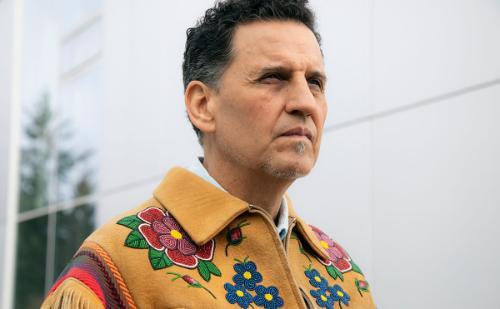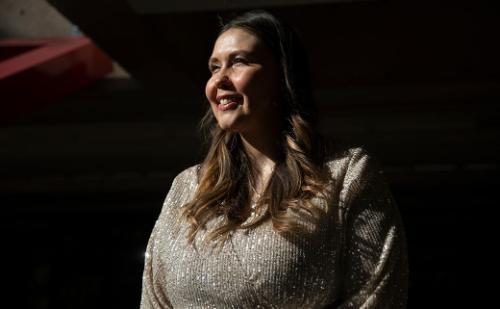What Makes a Good Warrior
Published7 April, 2022
Photo credit Steph Townsend
Learning from Elder Robert Joe.

On the gillnetter, looking over the shining waters of the Inlet, his grandfather asked him: “Robert, can you see the gold?”
He could not.
“Look harder,” said his grandfather. Still, the gold did not appear. The boat continued on its way.
After a time, his grandfather said, “See what the sun touches. It’s the water, son. When you grow up, water will be more valuable than gold. Whatever the sun touches and the rain falls upon, grow up and protect it.”

Elder Robert Joe comes from a long line of storytellers. Story is woven into his blood line and his ancestral line. His father’s grandfather and father were storytellers, as was his mother, who, he remembers, carried a story, of a woman, high ranking in the community, who gave birth to children able to shapeshift into dogs. This made them different and their parentage became a source of speculation in the community.
One night, as the mother slept, a relation painted the floor around her bedding. In the morning, a trail of paw marks in the paint resolved the mystery of the children’s father, but not the family’s status in the community.
Banished to an island, they could sometimes be seen dancing in front of a fire. One of the siblings could shapeshift into a little woolly dog, and the fur on its paw would be unwound and woven into blankets.
The story continues, its many threads offering new meanings to be discovered with the passage of time. Elder Robert Joe smiles as he recalls his mother, Diane Joe (nee Louie) telling the story.
“It takes time and experience to become wise. You have to have some faults, things you did wrong. Things you learned from. Learning from mistakes helps you gain your wisdom. Sometimes you learn the hard way.”
He looks over at his wife, Jessica Silvey, an artist, weaver and the Indigenous faculty advisor at kálax-ay | the Sunshine Coast Campus of Capilano University.
“The weaving,” they say in unison, appreciating the story for its connection to the creation of Coast Salish blankets, a skilled practice that continues to this day.
Stories are “the start,” says Elder Robert Joe of how we may learn from each other.
“Our stories, our ways, are intertwined.” It’s time, he believes, to change the direction of the dialogue, that we may learn from Indigenous knowledge, wise practices and perspectives.
“It’s time to turn it around. Hopefully now you can hear us.”
Family and identity
His mother and father’s generation were the last fluent speakers of she shashishalhem — the traditional language spoken by the shíshálh Nation. His ancestral name, pe’tal, was given to him by Elders of the past.
“We called them ‘old people’ back then,” he says. “Some of us still do. They were the ones teaching us right from wrong.”
His father’s father, Clarence Joe, Sr. was an interpreter between the Nation and the Indian agent.
“In those days, Elders chose what you would be,” he explains. They would watch and observe the young people, see what they were good at, set them on a path.

“It takes time and experience to become wise,” he says. “You have to have some faults, things you did wrong. Things you learned from. Learning from mistakes helps you gain your wisdom. Sometimes you learn the hard way.”
Like the time he was in the kitchen, helping his mother cook a meal: “I badmouthed her. I was disrespectful to the one who loved me most.” To this day, it still bothers him, but instead of hiding the experience away, he offers it openly to encourage others towards the deep learning that comes from regret and self-reflection.
A brother to five sisters, and two foster sisters, Elder Robert Joe is now a father and grandfather himself. His eldest daughter, Ashley Charleson, ?i-kat, is the employment training and post-secondary department manager for the shíshálh Nation. Her father believes in learning, but not in education as a means to claim superiority.
Learning and the land
Born in 1958, young Robert Joe was a day scholar at the Sechelt Indian Residential School, before beginning second grade at Sechelt Elementary. He considers himself lucky that because there weren’t enough beds in the dormitories for all the children, at the end of each day, he could go home to his parents.
“The bothering part to me,” he says of this experience, was how he heard his people constantly maligned. At school, the native kids were teased, insulted, stolen from, told they were dumb.
“We had to defend ourselves; I had to fight.”
For 13 years he led the Nation’s rights and title department. As litigation coordinator, he assembled a team of experts, among them an anthropologist, archeologist and historian, to develop, collaboratively, a case “that we owned the land, we defended the land and we used the land.”
In researching their case, they rented helicopters, planes and boats and flew over forested mountaintops to see the Territory. It was as his Uncle, Gilbert Joe, described it: freshwater ponds, grizzly bears, hellebore flowers growing in the alpine. And below, there were the beaches and midden sites where the ancestors harvested shellfish and set fish weirs to catch salmon.

Jervis Inlet on the Sunshine Coast, is “The Inlet” at the heart of his best childhood memories. Beginning when he was eight or nine years old, his family and others would stay in a dormant logging camp for six weeks in the summer (Robert’s grandfather, Clarence Joe Sr. had the contract to clear the land for the logging camp).
“There was every kind of fruit tree and a vegetable patch. Oysters and clams on the beach. It’s beautiful country. Peaceful. You feel safe and you feel at home up there. All the old reserves up there are next to rivers. A boat would take the older people up, to visit the reserves and remember where they used to live. I wish they would have lodges there now, and we could go stay there again; walk the trails; see the waterfalls, the trees, lakes of turquoise blue water. Our younger generation, they need to know where their ancestors came from.”
At 63, the fighting spirit is still strong in his bones. At the welcoming ceremony to formally introduce him to the CapU community, he wears a t-shirt, emblazoned with the message: “First Nations Warrior / Respect All. Fear None.”
When asked: “what makes a good warrior?” Elder Robert Joe does not hesitate. It all comes down to one word:
“Respect.”
Behind where he stands and says this, on a wall in his office at the kálax-ay campus, is a portrait of his grandfather, Clarence Joe, Sr., looking into the distance, a silent witness to the wise warrior his grandson has become.



